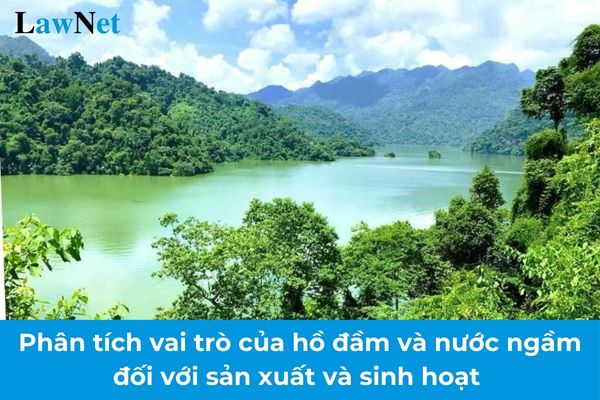What are the guidelines for analyzing the role of lakes, ponds, and groundwater in production and daily life for 8th-grade students in Vietnam? What geographical knowledge do 8th-grade students learn?
What are the guidelines for analyzing the role of lakes, ponds, and groundwater in production and daily life for 8th-grade students in Vietnam?
Lakes, ponds, and groundwater are two critical water resources and play essential roles in human life and economic development. Their roles are distinctly highlighted in two main areas: production and daily living.
Students may refer to the following guidelines for analyzing the role of lakes, ponds, and groundwater in production and daily life:
| 1. For Production - Providing irrigation water: Lakes, ponds, and groundwater are primary water sources for agriculture, especially in plains, arid areas, or regions lacking large river systems. Using water from these sources helps maintain soil moisture, increase crop yield, and ensure a food supply. - Aquaculture and fishing: Lakes and ponds are ideal habitats for many natural aquatic species like fish, shrimp, and crabs. Beyond fishing, people also use artificial lakes and ponds, along with groundwater, for aquaculture, bringing significant economic value and creating jobs for many workers. - Supporting industry: Groundwater is a vital water source for industrial production activities, especially in sectors that require clean water such as food processing, textiles, paper manufacturing, and energy production. Lakes and ponds are also used for cooling in large industrial plants. - Regulating flow and mitigating natural disasters: Lakes and ponds play crucial roles in regulating natural water flows, reducing flood risks during the rainy season, and providing water reserves in the dry season. This creates favorable conditions for uninterrupted production activities. 2. For Daily Life - Providing domestic water supply: Lakes, ponds, and groundwater are main sources serving daily human needs. Groundwater, after being extracted and treated, becomes drinking water and is used for activities such as bathing, laundry, cooking, and personal hygiene. - Maintaining long-term water reserves: Groundwater is considered a strategic reserve, particularly important in the context of climate change, leading to increased droughts and water scarcity. Lakes and ponds also hold large surface water reserves, contributing to stable water supply for communities. - Climate regulation and environmental protection: Lakes and ponds help reduce ambient temperature, creating a cool and pleasant atmosphere. Groundwater aids in maintaining soil moisture, protecting forests and grasslands, thus preserving natural ecosystems and balancing living environments. - Recreation and tourism development: Many natural or artificial lakes and ponds become attractive tourist and recreational destinations. Activities such as boating, fishing, camping, or water sports at lakes and ponds not only bring economic value but also meet entertainment and relaxation needs. 3. Conclusion Lakes, ponds, and groundwater are precious natural resources with indispensable roles in both production and daily life. They not only provide water for agriculture, industry, and human life but also contribute to environmental protection, ecosystem preservation, climate regulation, and natural disaster prevention. To ensure these resources are sustainably maintained, reasonable exploitation measures should be implemented, along with strict protection and management to best serve human needs now and in the future. |
Note: The content is for reference purposes only.

What are the guidelines for analyzing the role of lakes, ponds, and groundwater in production and daily life for 8th-grade students in Vietnam? What geographical knowledge do 8th-grade students learn? (Image from the Internet)
What geographical knowledge do 8th-grade students in Vietnam learn?
Under Section 5 of the General Education Program for History and Geography at the lower secondary level issued with Circular 32/2018/TT-BGDDT, the geographical knowledge that 8th-grade students learn is as follows:
(1) CHARACTERISTICS OF VIETNAM'S GEOGRAPHICAL POSITION AND TERRITORY
- Characteristics of the geographical position and territorial extent
- Influence of the geographical position and territorial extent on the formation of Vietnam's natural geographical features
(2) CHARACTERISTICS OF VIETNAM'S TOPOGRAPHY AND MINERALS
- General characteristics of the topography
- Topographical areas. Basic characteristics of each topographical area
- Influence of topography on natural differentiation and economic exploitation
- General characteristics of Vietnam's mineral resources. Key mineral types
(3) CHARACTERISTICS OF VIETNAM'S CLIMATE AND HYDROGRAPHY
- Tropical monsoon climate, diverse differentiation
- Impact of climate change on Vietnam's climate and hydrography
- Characteristics of rivers. Water regimes of some major river systems
- Lakes, ponds, and groundwater
- Role of climate resources and water resources in the country's socio-economic development
(4) CHARACTERISTICS OF VIETNAM'S SOIL AND BIODIVERSITY
- General characteristics of the soil cover
- Characteristics and distribution of major soil groups
- Issues of rational utilization of Vietnam's homestead land resources
- General characteristics of biodiversity
- Issues in conserving biodiversity in Vietnam
(5) VIETNAM'S SEA AND ISLANDS
- Geographical location, natural features of Vietnam's sea and islands
- Vietnam's sea regions in the East Sea
- Environment and resources of Vietnam's sea and islands
Are 8th-grade students who miss the end-of-term exam in Vietnam allowed to retake it?
According to Clause 4, Article 7 of Circular 22/2021/TT-BGDDT regarding periodic assessment for 8th-grade students:
Periodic assessment
...
4. Students who fail to obtain sufficient assessment scores as per Clause 2 and Clause 3 of this Article due to force majeure shall be eligible for attending the re-examination and re-assessment with corresponding qualification criteria. Organization of re-examination and re-assessment shall be performed in each semester.
...
Thus, 8th-grade students who miss the end-of-term exam will be allowed to retake it if there are force majeure reasons.

